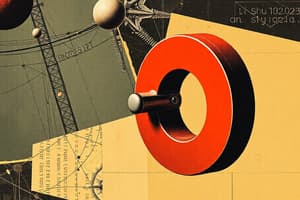Podcast
Questions and Answers
Match the devices with their use of magnets:
Match the devices with their use of magnets:
Hard drives = Store data MRI machines = Create images of the body's organs Speakers = Convert electrical signals into sound waves Maglev trains = Levitate above the tracks
Match the applications of magnets with their descriptions:
Match the applications of magnets with their descriptions:
Electric motors = Convert electrical energy into mechanical energy Credit cards = Store information on magnetic strips Refrigerator magnets = Stick to metal surfaces Doorbells = Generate a ringing sound
Match the items with their corresponding functions of magnets:
Match the items with their corresponding functions of magnets:
Magnetic locks = Secure doors and gates Compass needles = Point to the north Speakers and headphones = Help convert electrical signals Maglev trains = Reduce friction for high-speed travel
Match the medical device with its function involving magnets:
Match the medical device with its function involving magnets:
Match the devices with their specific usage of magnets:
Match the devices with their specific usage of magnets:
Match the following types of poles with their behavior:
Match the following types of poles with their behavior:
Match the following materials with their magnetic properties:
Match the following materials with their magnetic properties:
Match the following inventors/discoverers with their contributions:
Match the following inventors/discoverers with their contributions:
Match the following uses of magnets with their descriptions:
Match the following uses of magnets with their descriptions:
Match the following terms with their definitions:
Match the following terms with their definitions:
Flashcards are hidden until you start studying
Study Notes
Magnets and Their Properties
- Magnets have two poles: a north pole and a south pole.
- Opposite poles of magnets attract each other.
- Similar poles of magnets repel each other.
- Magnets can be found in different shapes such as ring and button magnets.
The Compass
- The compass, invented by sailors, always points in the North-South direction.
- The compass helps sailors navigate by indicating the direction of North.
Earth as a Magnet
- William Gilbert discovered that Earth is a giant magnet.
Lodestone
- Lodestone is a natural magnet.
- The Chinese used lodestones shaped like spoons to create compasses.
Magnetic Materials
- Materials attracted to magnets are called magnetic materials.
- Examples of magnetic materials include iron, nickel, and steel.
- Metals such as gold, aluminum, and copper are not magnetic.
- Non-metals such as wood, glass, and plastic are also not magnetic.
Uses of Magnets
- Mining: Magnets are used to separate unwanted metals from valuable minerals.
- Livestock: Cow magnets are used to prevent hardware disease by attracting and collecting metals in cows' stomachs.
- Electronics: Magnets are vital components in hard drives, speakers, microphones, and MRI machines.
- Transportation: Magnets are used in maglev trains to create levitation, allowing them to travel at high speeds.
Everyday Objects with Magnets
- Hard drives
- Speakers and microphones
- MRI machines
- Maglev trains
- Credit cards
- Doorbells
- Electric motors
- Magnetic locks
- Refrigerator magnets
- Compass needles
- Electronic devices like speakers, headphones, hard drives, electric motors, and MRI machines all contain magnets.
Studying That Suits You
Use AI to generate personalized quizzes and flashcards to suit your learning preferences.




